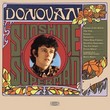|
|

From head to heart Following our retroscope series going on for several years, here we go again. Yes, for one more year! Here's Speakers' corner's cousin; From head to heart. Luna Kafé's focused eye on great events, fantastic happenings, absolute milestones, or other curious incidents from the historic shelves'n'vaults of pop'n'rock. Blowing our ears and our head, punching our chest and shaking our heart, or simply tapping our shoulder. Making us go sentimental, but not slaphappy. This moonth we present one of the classic 50-year-olds from the golden year of 1966, from an artist who became a friend of The Rolling Stones' Brian Jones and The Beatles. It's been said that he was the man who taught John Lennon a finger-picking guitar style, and he was compared to Bob Dylan several times (go see D.A. Pennebaker's 1967 Dylan-docu-film Don't Look Back). He was a singer-songwriter of the (psychedelic) pop-folk track, and he became flower power-man. After a line of popular singles in 1965/1966 ("Catch The Wind", "Colours", "Turquoise" and "Josie"), at least the US was exposed to his fab third album late in the real summer of love! 1966 rules!
Sunshine Superman is a documentary film from 2014 portraying the pioneer Carl Boenish of the base jumping movement with soundtrack composed by Norwegian musician, producer, member of Cloroform and occasional collaborator with Mike Patton, Kaada. It's also the third LP release by Donovan, (probably) celebrating its 50 years' anniversary this very moonth. Donovan Philips Leitch was born and bred in Glasgow, Scotland, but his family moved south to England when he was ten. By 1965 he was a vital part of the folk scene in London and his first two singles "Catch The Wind" and "Colours" (released in March and May 1965 respectively ) and debut album What's Been Did And What's Bin Hid (released in May) fared well on the British charts and not too bad in the Americas either. The following singles and his second album Fairytale didn't gain the same commercial success and that might partly explain Donovan's decision to change his musical direction, away from the poor man's British equivalent to Bob Dylan to a more modern and pop'y sound. He certainly had sensed the changes that was about to happen in popular music, too. He had visited Los Angeles and took great interest in the new burgeoning hippie movement on the American west coast. Ace producer of the day Mickie Most who'd had hit singles with The Animals and Herman's Hermits and arranger John Cameron were recruited and the recordings of the new album took place in December 1965 and the early moonths of 1966. The title track was released in July as the first single on our man's new record label in America, Epic Records. Due to a long-lasting legal dispute with his label at home, Pye Records, the single was not released in Britain until December 1966. Anyway, it's a great and pure and catchy pop song with a straight rock instrumentation apart from a, mainly, discreet harpsichord. Its most notable instrumental feature is session man Jimmy Page's twisting and churning guitar efforts. Quite different from Hüsker Dü's fast, dirty and funny version. Anyway, the single went to no. 1 on the American hit lists and established Donovan as an even bigger pop star there than in Europe. The album of the same name followed suit on 26 August 1966 (probably, some sources say July, others September, but most seem to go for August), but only in America. The other pop classic of the album "Season Of The Witch", again with Jimmy Page's electric guitar at the fore, reminds a little bit of what Bob Dylan was up to when he went electric the previous year, with a seminal organ solo, but more British pop oriented. A gem! "The Trip", also om the flip of the single in a slightly different mix, is even closer to Dylan going electric; merry, bluesy and folksy singer-songwriter stuff blended with a cunning pop sensibility. One might expect this to be an early example to describe an acid trip. And it is. From an experience in LA, it seems, at a time when LSD still was legal and considered an amusing and quite innocent drug. The chorus goes: 'What goes on? Chick-a-chick. The remaining songs of the album have little resemblance with Donovan the Dylan imitator of the previous year. The impulses from California can also be heard in "The Fat Angel", a bluesy folk-pop song augmented with Indian sitar and tablas. Written to Mama Cass of The Mamas And The Papas (that released their second album 50 years ago this very moonth) and also mention the psychedelic super group-to-be Jefferson Airplane in the lyrics. At a time when the band wasn't very established and Grace Slick was still to join. Jefferson Airplaine returned by playing the song live later on. Donovan also namedrops contemporary celebrities on the other side of the Atlantic. "Bert's Blues" is a jazzy folk-blues or bluesy folk-jazz song very much in the vein of the music by the man it pays homage to, his Scottish folk-jazz-blues troubadour colleague and guitar player extraordinaire Bert Jansch. Bert was a leading man in London's folk circuit at the time, on his own and in collaboration with his guitar mate John Renbourn, Sandy Denny and others. (John and Bert started up the very successful folk-blues-jazz-pop-rock band Pentangle the following year.) The song is dominated by double bass and harpsichord in the first half. The second is augmented with classical strings, a little bit of woodwind and a harpsichord solo, before a short cello and even shorter jazzy sax slot, that removes it from Bert. "Legend Of A Girl Child Linda" is about Linda Lawrence, the girlfriend of Rolling Stones' Brian Jones at the time. It's a pretty hippie ballad, richly arranged with classical strings and woodwind that sounds a bit outdated today. It has its charms all the same. "Guinevere", about the queen of King Arthur (of The Round Table), and the last song of the album, and "Celeste", follow suit with "Linda". The former is a medieval tinged folk ballad, really pretty, slightly coloured by sitar and tablas in the second half, while "Celeste" is a languishing pop ballad dominated by strings, harpsichord, glockenspiel and a little bit of sitar. Beautiful! What makes Sunshine Superman the album really stand out, though, is the use of sitar and tablas that dominate about half the album. They take complete control in the two folk-psych offerings "Three King Fishers" and "Ferris Wheel". However, they differ from "Love You To" and "Tomorrow Never Knows" off Beatles' Revolver and other early sitar excesses in western popular music where eastern instrumentation were used more or less an effect set to western melody lines. Donovan's melodies, especially of "Ferris Wheel", sound closer to Indian traditional folk. To be honest, the latter sounds a bit monotonous, as Indian folk music ought to, at least to an ignorant Western mind like mine ... Sunshine Superman doesn't have the same status as Revolver by those Fab Four from Liverpool nowadays at the time of the two albums' 50 years jubilee moonth. The latter was released on August the 5th, (probably) three weeks prior to the Superman. It might also have to do with Donovan's waning popularity after he and producer Mickie Most went their separate ways by the end of the 1960s. Admittedly, some of the Superman songs, at least a few of the arrangements, haven't quite stood the test of time as good as the Fab Four's greatest classic longplayer. But then, is there any other albums that can compete with Revolver? On the other hand, I guess Sunshine Superman was at least as ground-breaking as Revolver at the time of their releases. George Harrison didn't reach as far in his excursion into traditional Indian music as "Ferris Wheel" until the following summer, with his Beatles and Sgt. Pepper's most tedious song "Within You, Without You". Some of the other Sunshine Superman songs are early examples of psychedelic folk of the more western kind, what nowadays is labelled acid folk, like "The Fat Angel" and the ballads of the album. The Incredible String Band, also of Scotland, is considered a pioneer of the genre, but didn't release its first real psychedelic album until July 1967 (the band's second longplayer The 5000 Spirits Or The Layers Of The Onion; the first was a more conventional folk album). Btw., The String Band was in the stable of legendary record producer and manager Joe Boyd, along with Fairport Convention, Nick Drake, Sandy Denny, Richard Thompson, John Martyn and Vashti Bunyan to name a few, and almost the early Pink Floyd, too. His production company was called Witchseason, named after the Donovan song. The British version of the Sunshine Superman album wasn't released until June 1967. By then he had released one more album in America, Mellow Yellow, in the same vein as the predecessor with another title track hit. The British Sunshine Superman included seven of the ten songs from its American counterpart and five from Mellow Yellow. Our man continued to release excellent pop-psych-hippie-folk albums and hit singles in the following years, not least his maybe most famous song along with "Sunshine Superman", "Hurdy Gurdy Man" from the 1968 album of the same name. Though his popularity waned in the 1970s, especially after his tenth studio album, Cosmic Wheels, and his duet with Alice Cooper on the title track of Alice's Billion Dollar Babies, both in 1973. He has continued to release albums now and again throughout the decades. His latest studio album, about the twentyfourth, Shadows Of Blue, came in 2013. Sunshine Superman has been relaunched several times. A double CD with the very first stereo mix of the American version of the album augmented with several bonus tracks and the mono version of the British version augmented with the three missing songs from the American version was released in 2011. Sundazed Music has recently relaunched the original American mono version on vinyl and Donovan has a 50th anniversary Sunshine Superman North American tour coming up from late August until October followed by a retrospective tour in Denmark in December. Copyright © 2016 JP
|
| © 2016 Luna Kafé |
 Donovan
Donovan